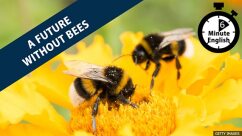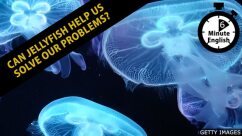Neil
Hello. This is 6 Minute English from BBC Learning English. I’m Neil.
Sam
And I’m Sam. It’s hard to feel positive when you hear about climate change, don’t
you think, Neil?
Neil
Yes, according to the UN’s Cop 26 conference, we’re heading for a catastrophic
global temperature rise of three degrees by the end of this century… Fires are
blazing from the Amazon to the Arctic... And even if we stopped burning all fossil
fuels tomorrow, it would take decades to feel the effects. It’s all very depressing!
Sam
I agree, but there is hope that catastrophes can be avoided thanks to some
amazing ideas by some very imaginative scientists. In this programme, we’ll be
discussing geoengineering – the name for a collection of new scientific plans to
remove carbon from the atmosphere and stop global warming.
Neil
Also called ‘climate repair’, geoengineering is still in the experimental stages.
Some technologies are controversial because they interfere with natural climate
systems, and others may not even be possible.
Sam
One ingenious idea to cool the planet involves spraying diamond dust in the sky
to deflect the Sun’s rays.
Neil
Amazing! But before we find out more, I have a question for you, Sam. Spraying
diamond dust in the sky sounds futuristic, but in the 1960s there was a band who
wrote a song called ‘Lucy in the Sky with Diamonds’. But which band? Was it:
a) The Rolling Stones?
b) The Beach Boys? or
c) The Beatles?
Sam
I think most people would say the answer is c) The Beatles.
Neil
OK, we’ll find out the answer later in the programme. Now, throwing diamonds in
the sky might sound crazy but it’s far from the wildest idea scientists have
thought up to decarbonise the planet.
Sam
Oceans hold sixteen times more carbon than the Earth’s atmosphere and could
hold even more if the fish and plankton living there had more available nutrients
– food that animals and plants need to grow.
Neil
But how to provide these nutrients? Believe it or not, one answer involves - you
guessed it - whale poo!
Sam
David King chairs the Centre for Climate Repair at Cambridge University. He
explained how his unusual idea would work to BBC World Service programme,
Discovery:
David King
Image now a pod of whales all coming up and pooing in the same area of the
ocean. This could be in an eddy current, and it could lead to something like
10,000 to 20,000 square kilometres being covered in nutrients, including iron.
And as we know from observations today, within three months that region is
chock-a-block with fish.
Neil
Whales live in groups called pods. They swim up to the ocean surface to poo, and
this poo can be spread in an eddy – a large current of water moving in a circular
motion, like a giant whirlpool.
Sam
As a result, huge areas of the ocean are covered in nutrients, and become chock[1]a-block with fish – an informal way to say ‘full of fish’.
Neil
Another original idea being explored is ‘rock weathering’. Carbon is slowly locked
into rocks and mountains over thousands of years by natural geological
processes. This literally ground-breaking idea would speed up the process by
locking carbon into rocks that have been dug up through industrial mining.
Sam
Listen as geochemist, Professor Rachael James, explains her idea to BBC World
Service’s, Discovery:
Rachael James
For every tonne of rock that’s mined, only a very tiny proportion, a couple of
grams of that, is actually diamond. The rest of it is effectively waste. So, mine
waste material is potentially a really great source of material that could be
repurposed for enhanced rock weathering and I think that’s really good because
it creates a circular economy.
Sam
Mining for diamonds creates tonnes of waste rock which could be used to
capture carbon. Professor James wants to repurpose this rock – to find a new use
for it.
Neil
Not only would this lock more carbon, it also creates a circular economy – an
economic model which involves sharing, reusing and recycling products for as
long as possible to avoid waste and to reduce levels of carbon.
Sam
While these ideas might sound strange, they’re all theoretically possible. And
looking to science for positive solutions reminds some people of the early
ecological movement which started in the 1960s and now, fifty years later, is
being taken seriously.
Neil
Speaking of the 1960s, it’s time to reveal the answer to my question, Sam.
Sam
Ah yes, you asked me which sixties band wrote the song, Lucy in the Sky with
Diamonds. I said, confidently, c) The Beatles.
Neil
Which was, of course… the correct answer! John Lennon and Paul McCartney
wrote the song in 1967 but I doubt even they could have predicted that it would
inspire a scientific idea to save the planet!
Sam
OK, let’s recap the vocabulary from the programme, starting with nutrients –
food that plants and animals need to grow.
Neil
Whales and other sea mammals like dolphins live in a group called a pod.
Sam
An eddy is a large current of water moving in a circular motion.
Neil
Chock-a-block is an informal way to say ‘full of something’.
Sam
If you repurpose something, you find a new use for it – a use other than what was
originally intended.
Neil
And finally, the planet’s future might depend on the circular economy – an
economic system which values sharing, reusing and recycling over consumption
and waste.
Sam
These incredible scientific innovations might mean that time is not yet up for
planet Earth - but time is up for this programme.
Neil
Join us again soon for more trending topics and related vocabulary here at 6
Minute English. Goodbye for now!
Sam
Bye!
VOCABULARY
nutrient
food that plants and animals need to live and grow
pod
group of whales, also other sea mammals such as dolphins
eddy
large current of water moving in a circular motion
chock-a-block
very full of people or things; plenty of something
repurpose
find a new use for something
circular economy
economic model which involves sharing, reusing, and recycling existing products
as long as possible to avoid waste and to fight climate change









